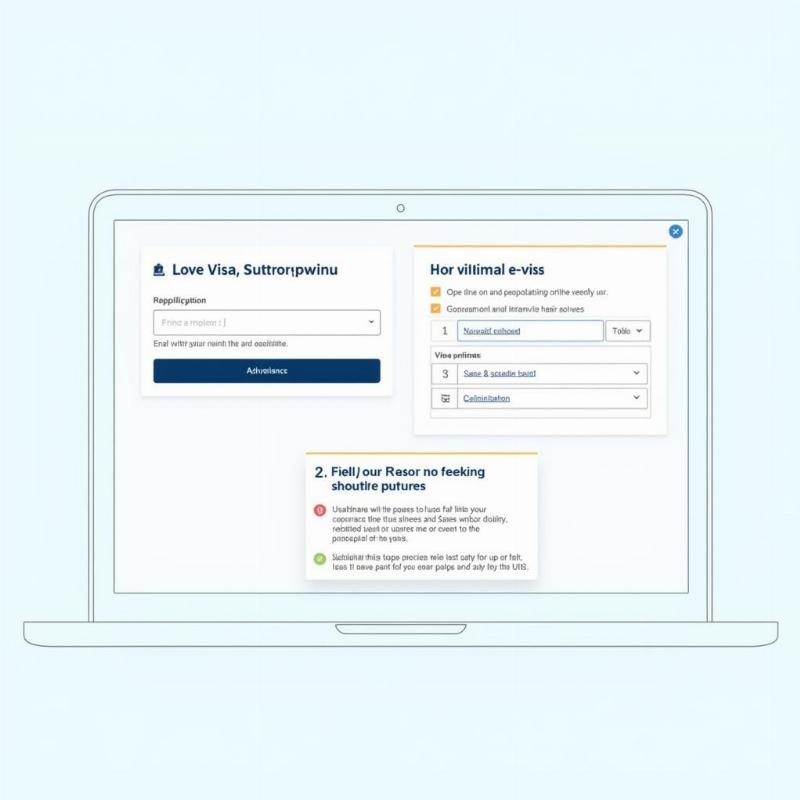Travel regulation 2014 saw some significant changes that impacted how Indians travel both domestically and internationally. Understanding these changes can make your travel experience smoother and more enjoyable. This article covers key aspects of the 2014 travel regulations, offering practical advice and insights for Indian travelers.
Key Changes in Travel Regulation 2014
The 2014 travel regulation updates primarily focused on visa policies, airport security, and passenger rights. These changes aimed to streamline processes, enhance security, and improve the overall travel experience. One crucial update was the introduction of the e-visa system for many nationalities, simplifying the visa application process for eligible travelers. Another notable change involved stricter security measures at airports, impacting both domestic and international flights.  E-Visa Application Process
E-Visa Application Process
Visa Regulations in 2014
The revised visa policies in 2014 played a crucial role in shaping international travel for Indians. The expansion of the e-visa program to include more countries was a significant development. This allowed travelers from eligible nations to apply for visas online, eliminating the need for physical visits to embassies or consulates. The changes also included adjustments to visa fees and processing times for various countries.
Airport Security Updates in 2014
Airport security measures were tightened in 2014 to address evolving security concerns. These updates involved enhanced screening procedures, stricter baggage checks, and updated regulations for carrying liquids and electronics. Understanding these changes is crucial for a hassle-free airport experience. Passengers were advised to arrive at airports well in advance to accommodate the new procedures.
Understanding Passenger Rights in 2014
The 2014 regulations also emphasized passenger rights, particularly concerning flight delays, cancellations, and baggage issues. Airlines were required to provide clear information to passengers regarding their rights and responsibilities in such situations. The regulations aimed to ensure fair treatment and compensation for passengers affected by travel disruptions.
What to do if your flight is delayed or cancelled?
If your flight is delayed or cancelled, the airline is obligated to inform you about the reason and provide updates on the revised schedule. In certain cases, you may be entitled to compensation, meals, or accommodation depending on the length of the delay or the circumstances of the cancellation. Familiarizing yourself with these rights can help you navigate such situations effectively.
How to deal with lost baggage?
Lost baggage is a common travel concern, and the 2014 regulations outlined procedures for reporting and resolving such issues. It’s crucial to report lost baggage to the airline immediately upon arrival and provide detailed information about your baggage and its contents. The airline will then initiate a tracing process and keep you informed of the progress.
Conclusion
The travel regulation 2014 brought about important changes that influenced various aspects of travel for Indians. Understanding these regulations, particularly regarding visas, airport security, and passenger rights, can greatly enhance your travel experience. By staying informed and prepared, you can navigate the complexities of travel with ease and confidence.
FAQ
-
What is the e-visa system? The e-visa system allows eligible travelers to apply for visas online, simplifying the visa application process.
-
What are the restrictions on carrying liquids in hand baggage? Liquids are generally restricted to containers of 100ml or less, and they must be placed in a transparent, resealable bag.
-
What should I do if my baggage is delayed? Report the delayed baggage to the airline immediately upon arrival and provide them with the necessary details.
-
What are my rights if my flight is cancelled due to bad weather? In cases of cancellations due to extraordinary circumstances like bad weather, airlines may not be obligated to provide financial compensation, but they are generally required to offer alternative travel arrangements.
-
Where can I find more information about travel regulations? You can find more detailed information about travel regulations on the official websites of the respective government authorities and airlines.
-
How do I apply for an e-visa? You can apply for an e-visa through the official government website designated for e-visa applications.
-
What are the common reasons for visa rejection? Common reasons for visa rejection include incomplete applications, insufficient documentation, or concerns regarding the applicant’s purpose of travel.
Expert Insights:
- Shreya Sharma, Travel Consultant: “Staying informed about travel regulations is crucial for a smooth journey. The 2014 updates simplified visa applications for many, making international travel more accessible.”
- Vikram Singh, Aviation Security Expert: “The enhanced security measures implemented in 2014 contribute significantly to safer air travel. Passenger cooperation plays a key role in the effectiveness of these measures.”
- Neha Patel, Passenger Rights Advocate: “Understanding your rights as a passenger empowers you to navigate travel disruptions effectively. The 2014 regulations provide a framework for fair treatment and compensation in such situations.”
PlaTovi, your trusted travel partner, specializes in crafting unforgettable travel experiences. From traditional tour packages to visa assistance, we offer a comprehensive range of services to cater to your travel needs. Contact us today at [email protected] or +91 22-2517-3581 to plan your next adventure. Let PlaTovi take care of your travel arrangements while you focus on creating lasting memories.